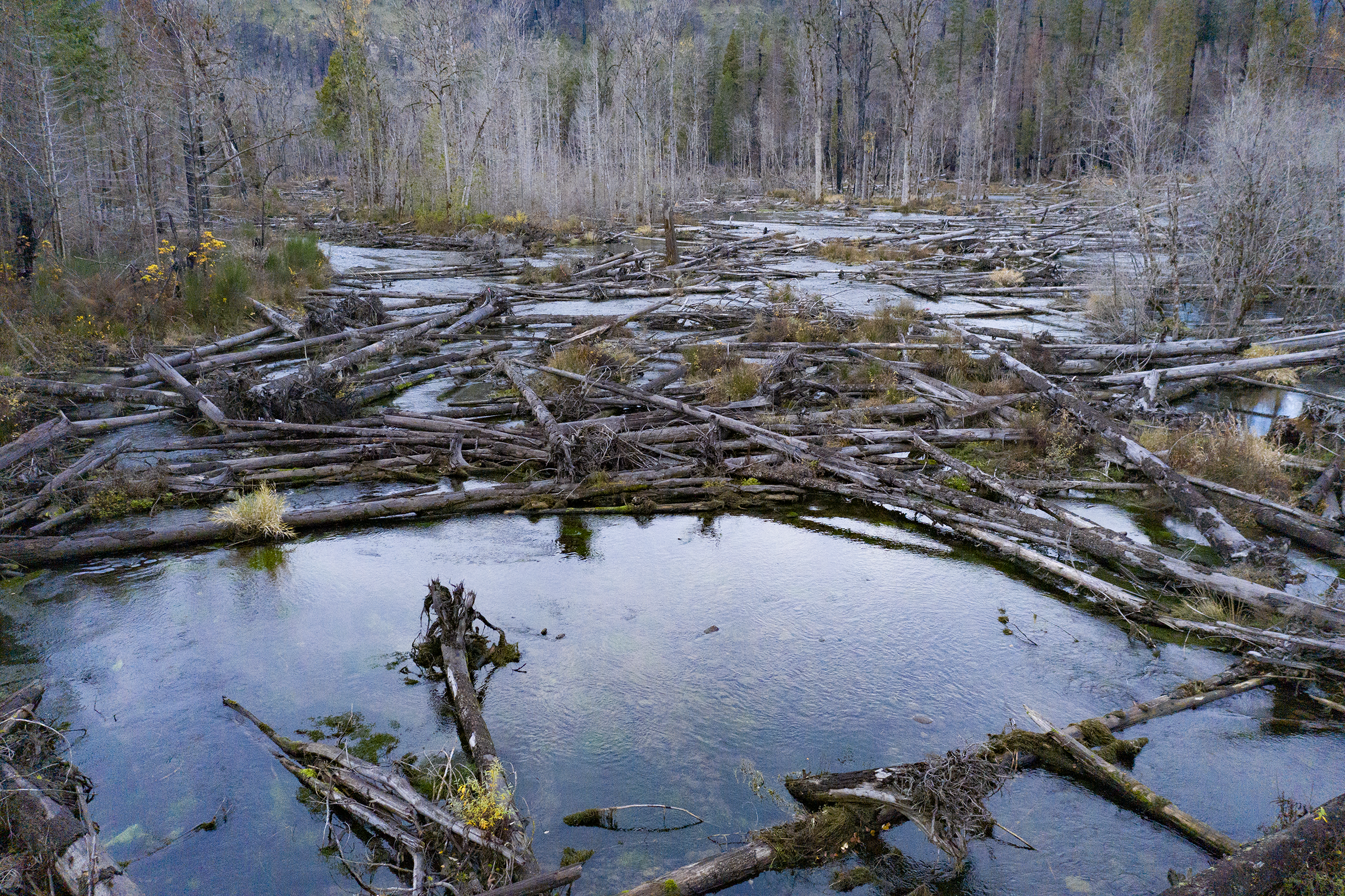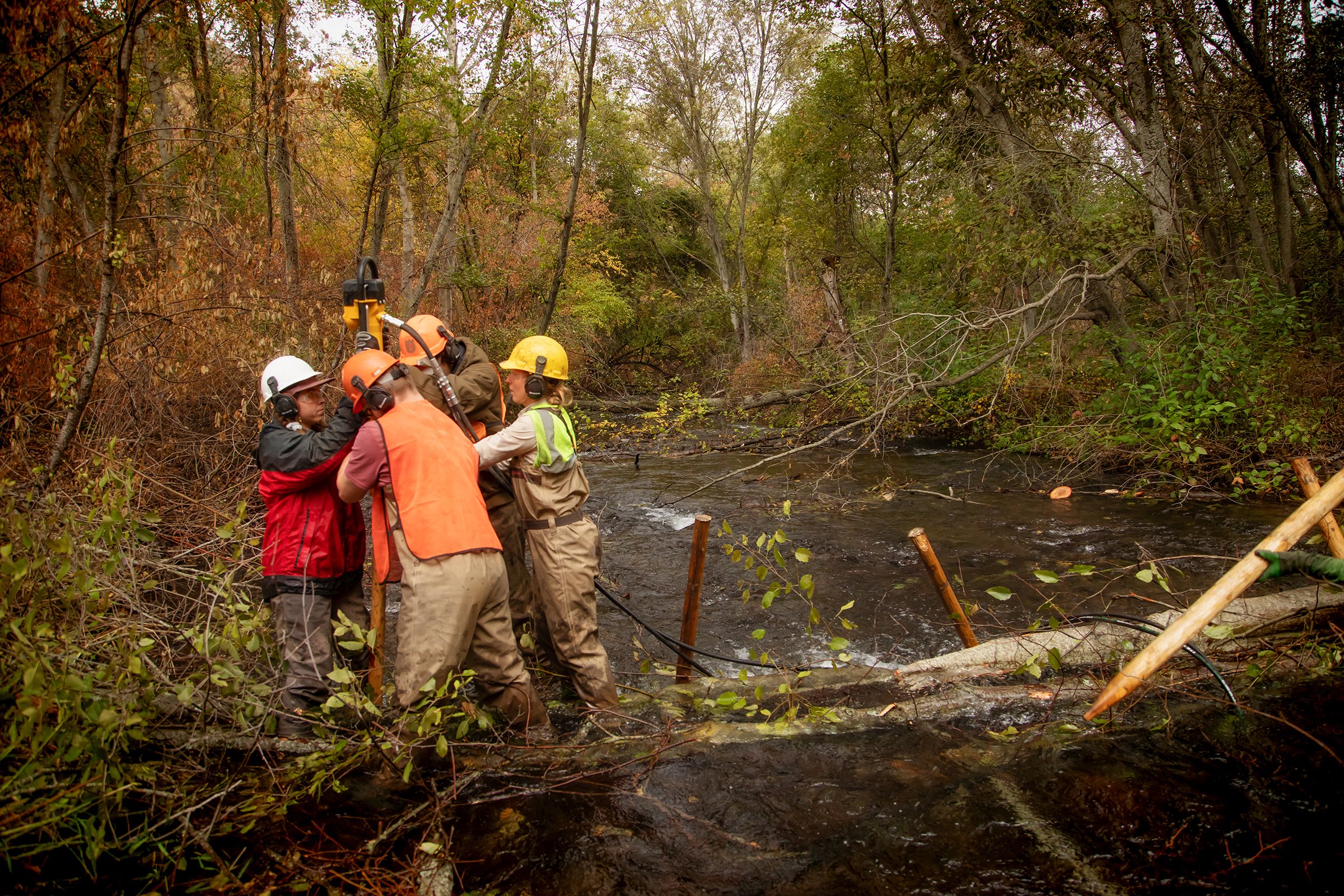
Advancing process-based actions
Our inaugural workshop was held virtually in March 2023. This course engages with the practice of riverscape restoration and its universe of opportunities and constraints through dynamic expert presentations, stories of place, and collaborative engagement sessions. We encourage you to watch the workshop in chronological order, as we’ve structured it with intention, each part building upon the last. Press the “Start Course” button below to begin, or, scroll down to any section and click the triangular “play” icon to access the content of that specific Part.
-
-
Introduction to process-based riverscape restoration
This workshop is designed to lay the science and practice foundation for what we are calling process-based riverscape restoration (PBRR) using examples from across California, Oregon, Washington, and Idaho.
Highlights:
Introduction from Chris Jordan and Irma Lagomarsino
Welcome message from Jeff Mitchell, Citizen of the Klamath Tribes
Workshop plan and logistics
This workshop is designed to lay the science and practice foundation for what we are calling process-based riverscape restoration (PBRR) using examples from across California, Oregon, Washington, and Idaho.
Highlights:
Introduction from Chris Jordan and Irma Lagomarsino
Welcome message from Jeff Mitchell, Citizen of the Klamath Tribes
Workshop plan and logistics
-
-
-
Part 1: Examples of process-based riverscape restoration
We kick off the program with an introduction to the vocabulary of riverscape restoration - words, images, ideas, and inspiration.
Highlights:
Story of Stewardship: Wallowa River
Case Study: Johnson Creek, with Lisa Huntington
Conversation: “What is a Riverscape?” with Colden Baxter and Chris Jordan
Project Montage: Five Mile Bell
Case Study: Elwha Dam Removal, with George Pess
We kick off the program with an introduction to the vocabulary of riverscape restoration - words, images, ideas, and inspiration.
Highlights:
Story of Stewardship: Wallowa River
Case Study: Johnson Creek, with Lisa Huntington
Conversation: “What is a Riverscape?” with Colden Baxter and Chris Jordan
Project Montage: Five Mile Bell
Case Study: Elwha Dam Removal, with George Pess
-
-
-
Part 2: Science foundations of process-based riverscape restoration
How does understanding the physics and biology of functional riverscapes give us the recipe for process-based riverscape restoration?
Highlights:
Master Class: What’s missing in the riverscape? with Ellen Wohl
Master Class: A manifesto for biomic river restoration, with Colin Thorne
Master Class: Salmon in riverscapes, with Gabriel Rossi
Master Class: Principles of riverscape health, with Joe Wheaton
Master Class: Evolution is a process,with Janine Castro
How does understanding the physics and biology of functional riverscapes give us the recipe for process-based riverscape restoration?
Highlights:
Master Class: What’s missing in the riverscape? with Ellen Wohl
Master Class: A manifesto for biomic river restoration, with Colin Thorne
Master Class: Salmon in riverscapes, with Gabriel Rossi
Master Class: Principles of riverscape health, with Joe Wheaton
Master Class: Evolution is a process,with Janine Castro
-
-
-
Part 3: Evolution in thought and practice in process-based riverscape restoration.
How has the science of riverscapes and process-based thinking changed on-the-ground, in-the-channel, restoration actions?
Highlights:
Story of Stewardship: Whychus Creek
Conversation: Evolution of thinking in US Forest Service, with Paul Burns, Paul Powers, and Johan Hogervorst
Case Study: Doty Ravine Creek, with Damion Ciotti
Conversation: High mountain meadows, with Karen Pope and Sabra Purdy
How has the science of riverscapes and process-based thinking changed on-the-ground, in-the-channel, restoration actions?
Highlights:
Story of Stewardship: Whychus Creek
Conversation: Evolution of thinking in US Forest Service, with Paul Burns, Paul Powers, and Johan Hogervorst
Case Study: Doty Ravine Creek, with Damion Ciotti
Conversation: High mountain meadows, with Karen Pope and Sabra Purdy
-
-
-
Part 4: Motivation: data-driven evidence of uplift
What has watching, measuring, and learning from restored riverscapes taught us?
Highlights:
Welcome from Sammy Matsaw, fisheries biologist with the Shoshone-Bannock Tribe
Case study: South Fork McKenzie River, with Kate Meyer and Becky Flitcroft
Panel: The rapid biological fish response to PBRR, moderated by Ryan Bellmore, with George Pess, Dan Bottom, Nick Bouwes, and Carson Jeffres
What has watching, measuring, and learning from restored riverscapes taught us?
Highlights:
Welcome from Sammy Matsaw, fisheries biologist with the Shoshone-Bannock Tribe
Case study: South Fork McKenzie River, with Kate Meyer and Becky Flitcroft
Panel: The rapid biological fish response to PBRR, moderated by Ryan Bellmore, with George Pess, Dan Bottom, Nick Bouwes, and Carson Jeffres
-
-
-
Part 5: Motivation: healthy riverscape benefits –and– Part 6: The pivot moment
What are the broad societal and ecological benefits of functional riverscapes? What is holding us back from pursuing them?
Highlights:
Panel: Working lands, moderated by Greg Addington, with Becky Hatfield Hyde, Jay Wilde, Julie Rentner, and Jeremy Maestas
Conversation: Salmon recovery and riverscape function, with Tommy Williams and Charlotte Ambrose
Story of Stewardship: Vesper Meadow
What are the broad societal and ecological benefits of functional riverscapes? What is holding us back from pursuing them?
Highlights:
Panel: Working lands, moderated by Greg Addington, with Becky Hatfield Hyde, Jay Wilde, Julie Rentner, and Jeremy Maestas
Conversation: Salmon recovery and riverscape function, with Tommy Williams and Charlotte Ambrose
Story of Stewardship: Vesper Meadow
-
-
-
Part 7: Challenge: collaborative conservation
Can you successfully implement projects without collaborative relationships?
Highlights:
Conversation: Collaborative conservation, featuring Hannah Gosnell and Laura Van Riper
Can you successfully implement projects without collaborative relationships?
Highlights:
Conversation: Collaborative conservation, featuring Hannah Gosnell and Laura Van Riper
-
-
-
Part 8: Challenge: current land use
Can we find parcels in the built riverscape where we can still significantly restore functions?
Highlights:
Case Study: Floodplain fatties, with Carson Jeffres and Jacob Katz
Case Study: Gravel mines to floodplains, with Jeremy Svehla and Brian Cluer
Case Study: Golf course to floodplain, with Katrina Harrison Christy Fisher and Jake Smith
Can we find parcels in the built riverscape where we can still significantly restore functions?
Highlights:
Case Study: Floodplain fatties, with Carson Jeffres and Jacob Katz
Case Study: Gravel mines to floodplains, with Jeremy Svehla and Brian Cluer
Case Study: Golf course to floodplain, with Katrina Harrison Christy Fisher and Jake Smith
-
-
-
Part 9: Challenge: historic land use
If we've lost touch with pre-occupation riverscapes, how do set effective restoration goals?
Highlights:
Case Study: 50 years of misdiagnosing floodplains, with Dorothy Merritts
Case Study: Ghosts of rail-based logging, with Damon Holzer
Case Study: Historical river wetland corridors, with Sean Baumgarten
Case Study: Learning from new tools to better diagnose the root problems, with Paul Powers
If we've lost touch with pre-occupation riverscapes, how do set effective restoration goals?
Highlights:
Case Study: 50 years of misdiagnosing floodplains, with Dorothy Merritts
Case Study: Ghosts of rail-based logging, with Damon Holzer
Case Study: Historical river wetland corridors, with Sean Baumgarten
Case Study: Learning from new tools to better diagnose the root problems, with Paul Powers
-
-
-
Part 10: Challenge: cultural barriers
Why does it feel like we need to change so many minds in order to move riverscape restoration ahead?
Highlights:
Case Study: Beaver-managed floodplains, with Mark Beardsley
Cast Study: Wildfire as a model of process-based restoration, with Lenya Quinn-Davidson
Conversation: Disturbance is the process, with Gordie Reeves and Paul Hessberg
Panel: The role of Federal Lands in the future of riverscape restoration, with Harv Forsgren, Amy McNamara, Brett Roper, Alden Shallcross, Shelby Weigand
Why does it feel like we need to change so many minds in order to move riverscape restoration ahead?
Highlights:
Case Study: Beaver-managed floodplains, with Mark Beardsley
Cast Study: Wildfire as a model of process-based restoration, with Lenya Quinn-Davidson
Conversation: Disturbance is the process, with Gordie Reeves and Paul Hessberg
Panel: The role of Federal Lands in the future of riverscape restoration, with Harv Forsgren, Amy McNamara, Brett Roper, Alden Shallcross, Shelby Weigand
-
-
-
Part 11: Challenge: the structure of salmon funding
How can we fund riverscape-scale restoration work?
Highlights:
Welcome back with Meta Loftsgaarden
Panel: Selecting and funding salmon habitat restoration programs, with Randi Shaw, Courtney Shaff, Marc Duboiski, Abbie Gongloff, Tim Chorey
How can we fund riverscape-scale restoration work?
Highlights:
Welcome back with Meta Loftsgaarden
Panel: Selecting and funding salmon habitat restoration programs, with Randi Shaw, Courtney Shaff, Marc Duboiski, Abbie Gongloff, Tim Chorey
-
-
-
Part 12: Challenge: federal regulations
Asking permission or begging forgiveness - what is the guiding principle to evolving the environmental compliance of riverscape restoration?
Highlights:
Story of Stewardship: Little Bear Creek, with Pam and Brian Roberston
Panel: Federal regulations: Environmental compliance of riverscape restoration, with Michelle Nijhuis, Michael Tehan, Kristen Hafer, Zane Hadzick, and Jared Bottcher
Asking permission or begging forgiveness - what is the guiding principle to evolving the environmental compliance of riverscape restoration?
Highlights:
Story of Stewardship: Little Bear Creek, with Pam and Brian Roberston
Panel: Federal regulations: Environmental compliance of riverscape restoration, with Michelle Nijhuis, Michael Tehan, Kristen Hafer, Zane Hadzick, and Jared Bottcher
-
-
-
Part 13: The way forward
Is inspiration and hope possible in light of all the challenges we have explored?
Featuring:
Closing Remarks: Scott Rumsey
Message of Success: Erika Lovejoy
Keynote Address: Amy Bowers Cordalis
Is inspiration and hope possible in light of all the challenges we have explored?
Featuring:
Closing Remarks: Scott Rumsey
Message of Success: Erika Lovejoy
Keynote Address: Amy Bowers Cordalis
-

